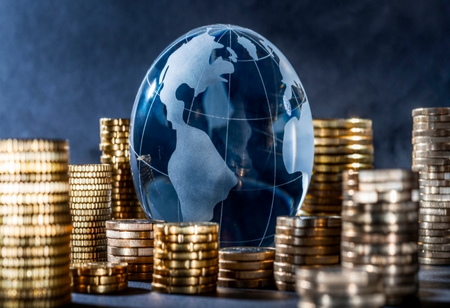By Global Consultants Review Team
 The global economy is on the verge of a recession, with the UN Trade and Development (Unctad) forecasting a mere 2.3% growth in world GDP for 2025, which is less than the 2.5% threshold that signals a recession.
The global economy is on the verge of a recession, with the UN Trade and Development (Unctad) forecasting a mere 2.3% growth in world GDP for 2025, which is less than the 2.5% threshold that signals a recession.
The agency's most recent "Trade and Development Foresights 2025" report paints a bleak picture of escalating trade tensions, unprecedented policy uncertainty, and disrupted supply chains caused by President Donald Trump's tariff barrage. However, the Middle East emerges as a symbol of resilience, with Unctad projecting 3.2% regional growth, fueled by rising oil production and strategic economic policies, despite the ongoing Gaza conflict's consequences.
The Middle East's economic buoyancy contrasts sharply with the global slowdown, which has decelerated significantly from pre-pandemic levels.
According to World Bank forecasts, the UAE, a regional powerhouse and the Arab world's second-largest economy, will grow by 3.8% this year, boosted by tourism, real estate, and financial services. Saudi Arabia, the region's largest Arab economy, is expected to grow by 3.5% in 2025, boosted by increased oil output under Opec+ agreements. The kingdom's Vision 2030 diversification efforts, which include $1 trillion in non-oil projects, support growth, with the IMF estimating non-oil GDP growth of 4.5% in 2024.
Qatar's LNG expansion, which is expected to grow by 2.8%, further strengthens the region's outlook.
Turkiye, which sits between Europe and the Middle East, is expected to grow by 2.9% this year, boosted by monetary easing, robust public spending, and a competitive exchange rate that increases exports. Despite inflationary pressures — consumer prices are expected to rise by 49% in early 2025, according to Turkey's central bank — export growth to the EU and Gulf states remains strong, valued at $260 billion in 2024. However, the Gaza conflict, which has displaced over 1.9 million Palestinians and cost the UN $20 billion in damages, casts a shadow, disrupting trade routes and investor confidence in neighboring Jordan and Lebanon.
Unctad warns that global trade policy uncertainty, which is at its peak this century, is stifling investment and hiring. US tariff threats, including proposed 25% levies on imports, have already disrupted supply chains, and global trade growth is expected to slow to 1.8% in 2025 from 2.5% in 2024. The report highlights a surge in financial volatility, with the VIX index reaching 25 in Q1 2025, indicating investor concern.
Developing countries, particularly low-income economies, face a "perfect storm" of rising debt (the IMF estimates global public debt will reach $97 trillion by 2024) and deteriorating external financial conditions.
However, the Middle East reaps the benefits of its strategic position in global energy markets. Oil prices, though volatile at $65 per barrel (S&P Global estimate), help GCC countries maintain fiscal stability, with breakeven prices ranging from $55 (Qatar) to $85 (Saudi Arabia), according to Bloomberg Economics. However, prolonged trade disputes may depress demand, resulting in further price drops that could strain fiscal balances.
Unctad emphasizes the growing importance of South-South trade, which will account for one-third of global trade and be worth $5.5 trillion by 2024. Intra-regional trade in the Middle East has increased significantly, particularly within the GCC, with non-oil trade among members expected to rise 15% to $150 billion by 2024, according to the GCC Statistical Center. Agreements like the UAE-India Comprehensive Economic Partnership, which increased bilateral trade to $85 billion, demonstrate the potential for South-South integration. Turkey's trade with GCC countries has increased by 20% to $30 billion, underscoring this trend.
To counter global headwinds, UNCTAD calls for urgent dialogue and strengthened regional coordination. In the Middle East, initiatives such as the Arab League's Greater Arab Free Trade Area, which includes 18 countries, seek to boost intra-regional trade, but political tensions impede progress. The GCC's unified economic policies, which include a customs union by 2027, provide a model for resilience. Globally, Unctad advocates for coordinated action to restore trust, warning that without it, development goals, including the UN's 2030 Agenda, are jeopardized.
The Middle East's 3.2% growth projection for 2025 demonstrates its ability to navigate global challenges while leveraging oil wealth and diversification. Saudi Arabia's $800 billion in sovereign wealth fund assets and the UAE's $1.5 trillion in foreign investments serve as buffers against volatility. However, risks remain: a worsening global recession or a protracted Gaza conflict could disrupt trade and investment flows. For the time being, the region's emphasis on South-South trade and domestic reforms positions it to weather the global downturn while also providing lessons for other developing economies facing an uncertain future.
We use cookies to ensure you get the best experience on our website. Read more...